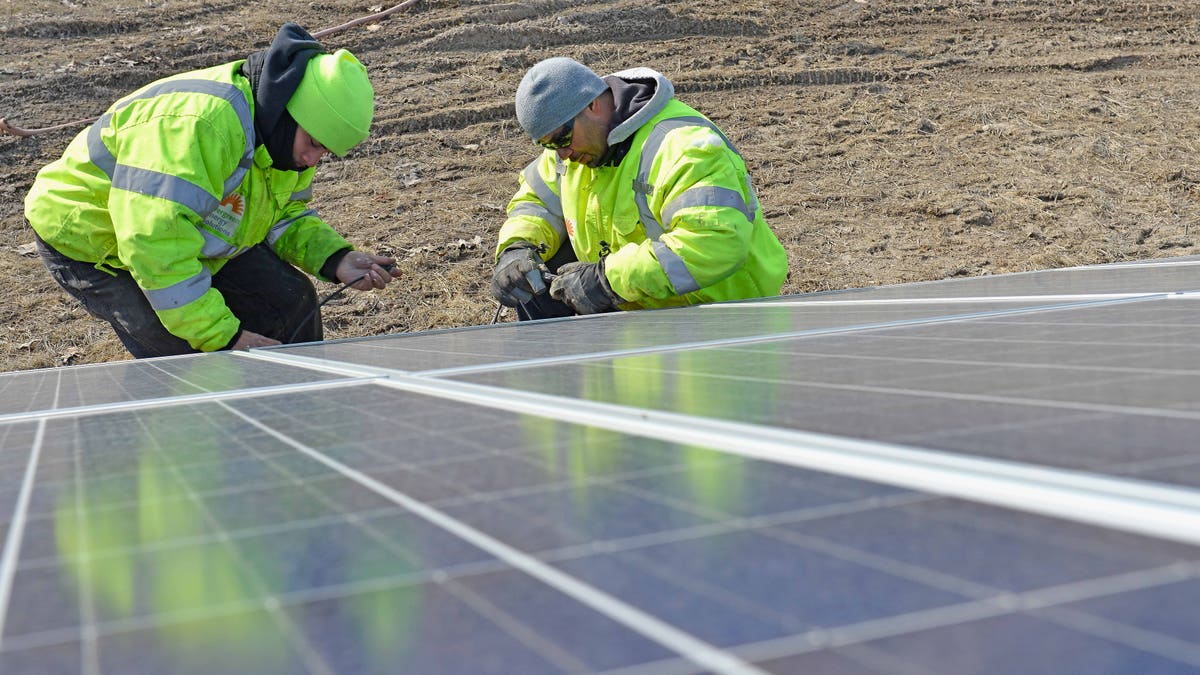
CLEVELAND, OH - MARCH 25: (L-R) Orlando Santaella Jr. and Orlando Santaella Sr. of Evergreen Energy Solutions work on a ground-mounted solar array located on Euclid Ave across the street from Lakeview Cemetery on March 25, 2014 in Cleveland, Ohio. (Photo by Duane Prokop/Getty Images for TakePart.org) (2014 Getty Images)
In a few weeks, Americans from across the country will come together to take part in the Low Income Home Energy Assistance Program (LIHEAP) Action Day to raise awareness of this important initiative to help those in need pay their energy bills. Energy affordability is a crucial issue for millions of American families, including in particular many Hispanic families, who have seen their median household wealth decrease by 14.3 percent from 2010 to 2013.
All told, forty-five million people live in poverty in the United States, representing 14.5 percent of the total population. What's more, the median income in this country is still 5.9 percent below 2000 levels. Many families across the U.S. are struggling to pay their bills, let alone save enough for a secure future. For these families, the American dream can sometimes seem unattainable.
The last thing anyone would suggest is that we should make lower income families pay more for energy than wealthier families. But that is, in fact, what's happening in a number of U.S. states, due to a policy called net metering.
These families face countless costs, but energy ranks high on the scale of household expenditures. Lower income families - with gross annual income of less than $30,000 - were projected to spend roughly one-quarter of their income on energy costs last year. This is not pocket change for such families. Of course, programs like LIHEAP assist low income families with these costs, but this can't solve the whole problem.
Policymakers should be doing everything they can to address this situation, and one of the key ways to help needy families is to make sure that energy remains affordable. The less these families have to spend on energy, the more they are able to save and invest in their futures. Education, housing, food — all these things eat up enough of their budgets already. The last thing anyone would suggest is that we should make lower income families pay more for energy than wealthier families. But that is, in fact, what's happening in a number of U.S. states, due to a policy called net metering.
One would think a policy like net metering that was meant to help grow the use of rooftop solar energy would be good for our communities. However, it is having an unintended impact on low-income Americans.
So what is net metering and how is it impacting many in our communities? Net metering is a policy that mandates consumers who produce extra electricity at their homes – usually via expensive rooftop solar systems – be able to sell that power back into the electric grid. When this happens, the electric company has to credit those consumers at the full retail rate of electricity, which is higher than the wholesale rate because it accounts for costs related to maintaining the poles and wires that allow the electricity to flow.
- U.S. Oil Companies Waiting To Pounce On Mexican Fields As Country Opens Industry
- Latinos Overwhelmingly Oppose Keystone XL Pipeline, Group Claims
- Contaminated water leads to protests and a rare defeat of a U.S.-backed dam project in Mexico
- At U.N. climate change summit, Obama urges world to follow U.S. lead; Maduro goads ‘polluting powers’
- Mexican Senate OKs Opening Oil Sector To Foreign And Private Companies
- Hugo Chavez murals are everywhere in Venezuela
- Best Latin American pix of the week
- The Rivera murals at Detroit Institute of Arts
The issue with this is that those consumers end up paying less than everyone else towards grid maintenance, since people without solar panels are not getting a similar reimbursement.
The kicker is that usually it's only wealthy families who can afford to install or lease solar panels, which typically cost $20,000 to $40,000 to buy or require high credit scores to lease. Let alone the fact that apartment-dwellers, and those living in public housing or renting their homes don't have the ability to take advantage of the perks of solar ownership.
This is not a tiny subset of the population either — in fact, roughly 75 percent of all residential rooftop areas in the U.S. do not have the right conditions for solar panels to be installed.
The more energy we can get from renewable sources, the better. But we need to be careful: the last thing we should be doing is making lower income families pick up more of the energy cost burden.
As we reflect on the importance of ensuring that lower-income families are not overly burdened with energy costs, especially in the current economic climate, I call on all policymakers to recognize the challenges posed by state net metering policies and make changes to these policies now to ensure that that all consumers are treated fairly, especially those with the least amount of money to spare.
Renewable energy can benefit us all, including the Hispanic community, but we need to make sure that these families don't have to shoulder unfair burdens.








































